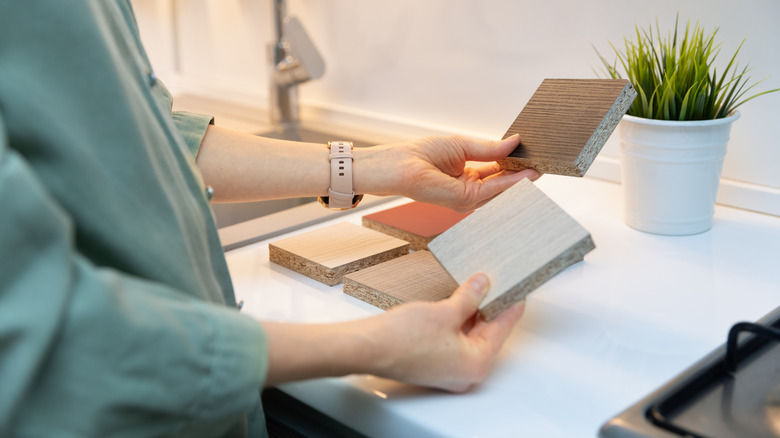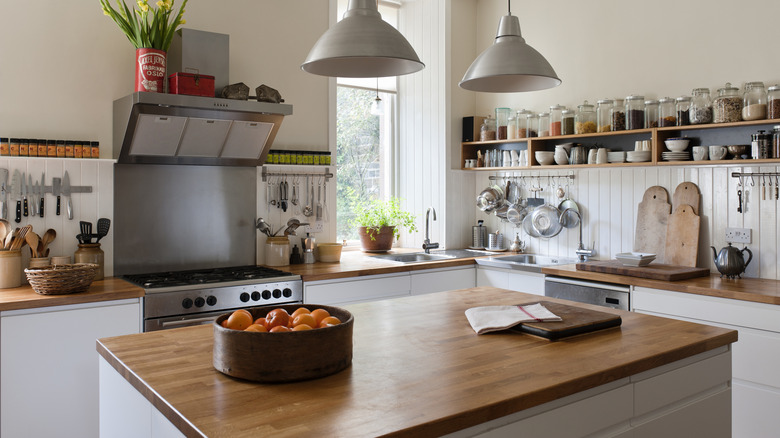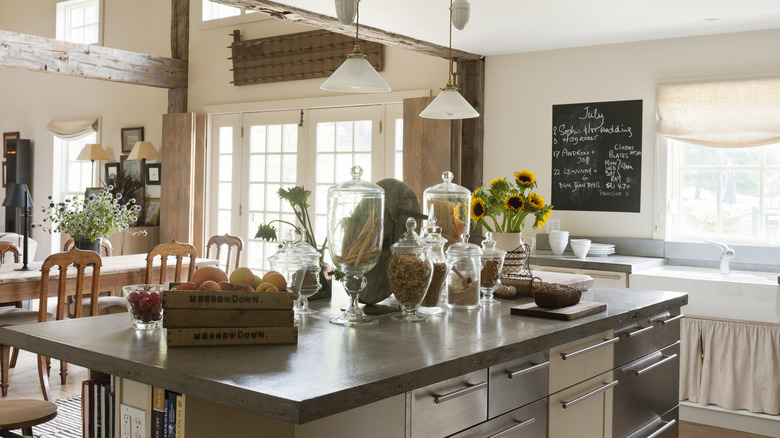The Price Difference Between Butcher Block Countertops Vs Concrete (And Which Is Right For You)
Sometimes it may seem like everyone has stone counters — you know, the fancy marble and granite. But there are plenty of other stylish countertop materials to consider for your kitchen. If you're looking for budget-friendly stone alternatives, butcher block and concrete are two standout options.
These materials may appear very different — one stark and industrial, the other warm and rustic — but they have many similarities, including their price. Homeowners can expect to pay somewhere between $50 and $150 per square foot for both butcher block and concrete countertops. However, as with any material, the exact price will depend on the size and design of your counters.
If you want premium slabs, be prepared for a hefty price tag. Red oak is an inexpensive wood option averaging $15 to $50 per square foot, while zebrawood, known for its unique grain pattern, costs $200 to $300 per square foot. With concrete, uncolored and unpolished counters are on the low end, ranging from $50 to $90 per square foot. Slabs that are stained and polished are on the more expensive side at $100 to $150 per square foot. Still, the average cost for homeowners with a typical 35-square-foot countertop is roughly $3,750 for wood and $3,500 for concrete. With two products so closely aligned on price, exploring the other pros and cons can help you decide which is best for your home.
Pros and cons of butcher block countertops
Many people love their butcher block countertops because you can meal prep directly on them (assuming you used a natural, food-safe sealer like tung oil). They're a tabletop and cutting board all-in-one. Using them for such tasks may degrade your countertops faster, but another benefit of butcher block is that they can be sanded and refinished anytime they start to wear. In fact, for smaller dings, you may be able to repair your scratched butcher blocks yourself. Plus, these counters are easy to buy and install on your own, which can bring the project costs down. Overall, butcher blocks are practical, durable, and stylish.
On the other hand, it's important to keep in mind that wood is porous and can absorb water if it's not sealed properly. Regularly oiling or waxing your countertops can help prevent damage, but that may be more maintenance than some homeowners are looking for. Similarly, a number of home chefs worry about the surface's bacterial resistance, especially if they plan to prepare food directly on the counter. Plus, the wood might not be able to withstand high temperatures, so you can't rest any hot cookware on top of it. With butcher block countertops you can stop dragging out your cutting boards, but you'll have to regularly clean, disinfect, and seal the surface.
Pros and cons of concrete countertops
If wood is a kitchen staple, concrete is a relative newcomer. It became popular due to its customizability in terms of color and texture. You can mimic the look of traditional stone or go bold and colorful for a stylish look. Concrete is also a durable material that's suitable for a high-traffic area. To save on installation, you might even consider building DIY concrete countertops, though it is not necessarily a project for novices. In general, these kitchen counters can be a trendy, cost-effective, and long-lasting option.
Despite its durability, concrete is not invincible. Not only can it crack but it can be dinged and chipped. Additionally, cutting directly on the countertop's surface is possible, but is not recommended because it can damage the seal. As with butcher block, concrete is porous. It requires a protective coating, and any damage to that shield could leave it vulnerable. Then it may need sanding and resealing. Further, concrete tops can stain or absorb liquids if the sealant is not kept in top shape.
These counters have many of the same downsides as butcher block, so if you're still unsure which to choose, it may come down to simple aesthetics. Or, perhaps, the ease of the regularly needed maintenance is a bigger concern. In the end, both would make stellar features. But before you decide, just be sure to avoid the crucial mistakes people make when choosing countertops.


